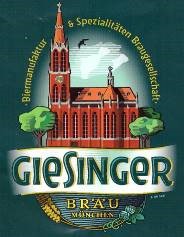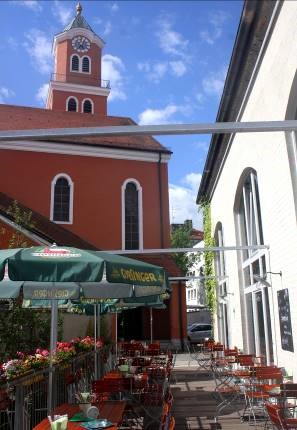 Thursday 30th July 2015
Thursday 30th July 2015
Bob Thompson
After the rain of the previous day that greeted my arrival in Munich it was a pleasure to walk in bright sunlight from the Silberhornstrasse U-Bahn station down the hill to this newly-established brewery.
It is situated on a busy road junction and is located between two large churches. Right next door is the Evangelische-Lutherkirch München (Protestant) and on the opposite side of the road junction is Heilig-Kreutz-Kirche (Holy Cross Church) (Catholic). The latter is featured as part of the brewery’s logo, above right.
You enter the property through the yard and I noticed the ramp on the right where off-sales transactions are conducted. In fact there was a man loading up the carrying basket on his bicycle with bottles. I climbed the outside steps to the small terrace. This seems to be a nice spot on a day like this with planters full of flowers and parasols to provide shade.
 I went into the building and noticed a bar in front of me where there were two men talking and shuffling lots of papers. To my left was the brewery itself and I took a photograph. At this point one of the men offered me a welcome to his brewery, his brewery!
I went into the building and noticed a bar in front of me where there were two men talking and shuffling lots of papers. To my left was the brewery itself and I took a photograph. At this point one of the men offered me a welcome to his brewery, his brewery!
I gave him a BeerVisits card and he reciprocated and it turned out he was Steffen Marx, the owner. I said I was pleased to be there and would write an article.
There were a number of tables and chairs but this was not the main bar room. It looked as if it was used as an overspill area. I continued up a flight of stairs and arrived at my destination.
 At one end of the room was a curved bar with a few stalls. It had a modern feel yet all of the furniture is made from wood, including the table tops which are polished.
At one end of the room was a curved bar with a few stalls. It had a modern feel yet all of the furniture is made from wood, including the table tops which are polished.
An intriguing feature are the light shades that dangled from the ceiling as they were partially made from flip-top bottles (bügelflaschen). The room accommodates 60 patrons.
I looked at the menu and also the blackboard on the wall. There are always four regular beers and two specials at any one time. The regular range with notes on ingredients are as follows:
Untergiesinger Erhellung (5.3%) is the brewery’s main Hell (Light) beer and uses the following malts: Pilsner, Sauermalz and Helles Caramelmalz. The hops are Hallertauer Tradition, Hallertauer Mittelfrüh and Saphir. Weissbier (5.5%) is a top-fermented wheat beer made with Wiener, Röstmalz, Dunkler Weizenmalz and Weizenkaramelmalz. Smaragd and Saphir hops are used.
Dunkel (5.3%) is the brewery’s dark beer using Pilsner, Münchner, Röstmalz and Dunkles Caramelmalz malts along with Opal hops. Märzen (5.8%) is their version of that style and contains Wiener, Rotes Caramelmalz and Sauermalz malts. The hops are Spalter Select and Hallertauer Mittelfrüh.
 The two Specials were both wheat beers:
The two Specials were both wheat beers:
Weissbierbock Hell (6.2%) made with Helles Weizenmalz and Dunkles Weizenmalz. The hops were Hallertau Tradition and Smaragd.
Sternhagel (8.5%) has Pilsner and Wiener Roter Caramelmalz malts. Cascade and Citra are the hops. This beer was only sold in 0.25l glasses, not surprising considering its strength.
Giesinger’s history dates back to 2006 when Steffen and partner Tobias Weber established a small brewery in a double garage a few streets away from the present-day operation. As well as those with the current name, beers with the Bierlaboratorium label were also produced. The plant expanded considerably and when it closed it occupied four double garages and produced over 1,000hl per annum.
They became a proper company in 2008. The new brewery and tap room was constructed throughout 2014 and eventually opened on 25th November of that year. So yet again, BeerVisits has an article on a brewery that has been open less than a year. The annual capacity is 12,000hl so it now has more than ten times the potential production than before.
 The beers are all unfiltered and unpasteurized on draught. Their bottled beers can be found all over the city and Southern Bavaria.
The beers are all unfiltered and unpasteurized on draught. Their bottled beers can be found all over the city and Southern Bavaria.
The brewery uses four open vessels for the primary fermentation and sixteen closed lager tanks for the secondary maturation. Steffen is adamant that the open tanks used for the initial maturation are very important to the taste.
Tours and brewing courses are a big thing here and when I visited there was a group of oversees students waiting for Steffen to guide them.
The pub and brewery are easy to get to; the U-Bahn train takes about 10 minutes from the city centre, the beers are good and the there is a full service menu, see below for kitchen times.
So there isn’t any reason why it should not be on any visitor’s sightseeing agenda.
Important Information:
Giesinger Bräustüberl, Martin Luther Strasse 2, 81539 München. Tel: 089 5506 2184
Open: Monday-Saturday 11.00-23.00; Sunday 10.00-22.00
Kitchen open: Monday-Sunday 11.00-14.30; 17.00-21.30
Probably the best way to get to this pub is by U-Bahn (Underground Railway) line U2 which at its most frequent is every 5 minutes. You alight at Silberhornstrasse station. It runs through the Hauptbahnhof (Main) station amongst others. Line U7 also operates to here.
At the station find the Silberhornstrasse exit. Go up the stairs and continue in the same direction to the road intersection with the large church on the right side of the road.
You will now see the pub on the other side.
Be careful as you cross; the traffic comes from all directions!
Trams 15 and 25 also come to Silberhornstrasse. They were replaced by buses when I visited because the road was being dug up outside the station.
You could also arrive and leave by Metrobus 58.
Update January 2020. Hours are now: Monday: Closed; Tuesday-Thursday: 11.00-23.00; Friday: 11.00-24.00; Saturday: 10.00-24.00; Sunday: 10.00-22.00.
